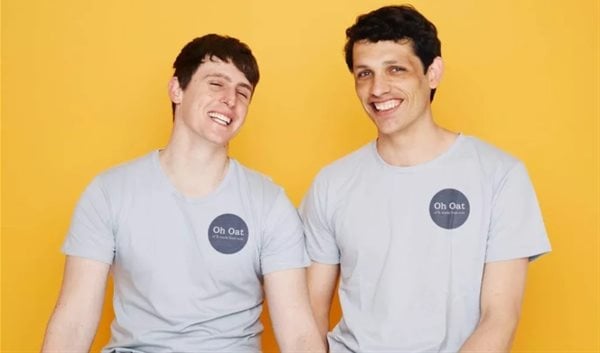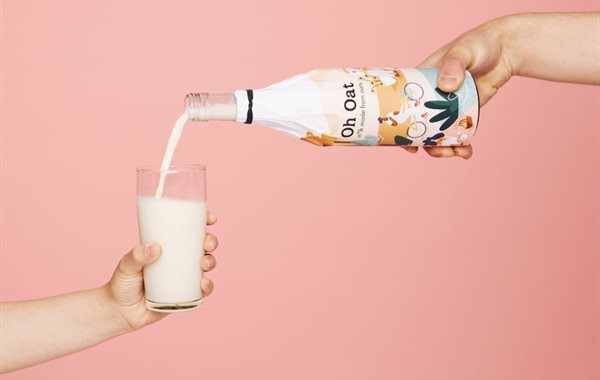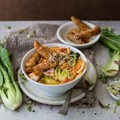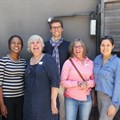Last year, serial entrepreneurs Trent Pike and Renato Marchesini finally launched Oh Oat as a fresh, clean label plant-based milk after two years of development. Oh Oat milk is made in Woodstock in Cape Town using only five ingredients, and a production process that eliminates the need for gums, additives or preservatives.
As advocates of circular design and plastic-free packaging, the food startup packages its oat milk in re-used and sanitised glass wine bottles collected from restaurants and wineries in Cape Town. A bottle deposit is charged on each sale to encourage customers to return their bottles for reuse.
With environmental, ethical and health concerns driving uptake of plant-based food products across the globe, on home soil it's encouraging to witness more small, local players adding innovative offerings to the available product mix on shelf.
Here, Trent Pike shares more on the inspiration and development process behind Oh Oat.
What sparked the idea to develop your own milk alternative, and an oat milk specifically?
Ren and I are always on the look-out for impactful business ideas or concepts. So during a typical conversation in 2018, oat m*lk was mentioned in passing as a great opportunity to disrupt the environmentally destructive dairy industry – 18-months later we had a product and months after that, we had built a factory in Woodstock.
Why oat m*lk? Our core values revolve around sustainability. Sustainability in terms of the environment, of course, but also personal sustainability, the sustainability of communities, and of health practices. Oat m*lk has been shown, again and again to be the most environmentally sustainable plant-alternative across almost every metric – land use, waste-use, pesticide use.
It’s also an extremely healthy drink (especially ours): we created a clean-label product that contains just five ingredients, no added sugars and a wholesome 20% oats.

Renato Marchesini and Trent Pike
The idea to develop our own m*lk instead of importing an overseas brand or white labelling an overseas product came from past experience and personal growth.
The contribution to the economy of a business built on imported products is net negative. Money leaves the economy, local innovation is stifled by unfair* competition and employment suffers as a result.
We are proud South Africans, and our sustainable vision can only be realised in a sustainable economy.
*imported products usually originate from countries with lax labour laws, human rights abuses and extremely low wages.
Plant-based milk alternatives are of course not all created equal. What sets Oh Oat apart from some of the more commercial plant milk brands on shelf?
Quality: We spent two years developing the recipe and process for our m*lk. Dozens of times during that period we had a good-enough product to launch to market. We didn’t because we wanted to develop the best oat m*lk in the world. And given feedback from hundreds of customers, we may have done just that. Our milk is incredibly creamy, and the texture is a dream for the perfect dairy-free flat white or cappuccino.
Clean-label: During development, we focused on creating a process that eliminated the need for gums, additives, or preservatives . Our milk is truly clean label, and contains only five ingredients.
Locally-produced: We’re one of the only local producers of plant-based m*lk in the country.
Fresh: When we started investigating the market, everyone was selling boxed, long-life m*lk which lasts 6-9 months on the shelf. So, we veered left. Fresh is best – not only in terms of taste, but also health. Long-life milk is heated at 140°C, killing all bacteria present (good and bad). Our light pasteurisation keeps the good stuff.
Wholesome: Our m*lk contains the highest content of oats on the market.
Plastic-free: We believe the packaging of a product is not separate from the product itself. So, when we considered the sustainability of our product, we had to consider the environmental impact of our packaging.
Our country and many countries around the world thrived on a glass bottle deposit system before throwaway culture took hold. We’ve gone back to basics and are attempting to re-introduce this model. It’s been a challenging decision, and right now it puts us at a competitive disadvantage, but long term, we do believe it’s a circular consumption model that South Africa sorely needs.
Oh Oat took about 2 years to develop. What was the most challenging aspect of the product development process?
Sticking to our core value of product quality. We were tempted to launch early, to add gums and stabilisers, and to package in plastic bottles. Industry norms kept telling us to do these things; “Everyone uses gums and stabilisers”, “Plastic is recyclable, everyone uses it”.
We hope to look back on our business journey with a clear conscience – that each decision we made considered sustainability first.
As such, we undertook intense academic research into industry norms and the external cost those norms force upon unknowing consumers and a defenceless environment. Our decisions to date have been informed by this research.
Hayley Richardson 7 Sep 2020
Can you touch on Oh Oat’s sustainable approach to packaging? How are the wine bottles sourced and reused?
We’re very proud of our packaging. We were adamant from day one that we would package in glass bottles, but cost, availability and our energy dilemma in South Africa were big concerns.
The genesis of the wine-bottle idea solved all those challenges and came when we were recycling old wine bottles. We drove to the depot, dropped the bottles in the glass bin and heard them smash to bits. We both thought what a waste of a perfectly good glass.
Renato then casually asked the question: “Why don’t we use old wine bottles as our packaging solution”. It’s been one of his most important questions.
Our bottles are collected from restaurants and wineries around Cape Town. They’re cleaned, sterilised and sanitised before being reused. We further increase their use through our m*lkman system: we charge a fully refundable glass deposit on our bottles, encouraging returns and thus further reuse.
Your branding and visual identity is quite distinctive, in a good way. What’s the inspiration behind it?
It ties in with our core value of sustainability. Our bottle wrap and illustration is our reflection of Cape Town. We live in a city that offers so much natural and cultural beauty. We wanted to pay homage to that beauty.
The illustration acts as a reminder of what we have to lose as Capetonians and South Africans if we don’t start being good stewards of our environment, economy and of each other.
In your opinion, how can consumers be encouraged to support more local brands?
We need an education drive around the true cost of imported products. I think if more consumers understood the net-negative cost of imported products on our local economy, more would shop locally.
It also starts with government support and legislation. It’s far too easy to import products from overseas, slap on a local brand and then charge cheaper prices than a local company. We’re an extremely price-sensitive nation. Unfortunately, the price-tag on the shelf isn’t reflective of reality.
The support of local businesses is the backbone of our economy. When consumers make the decision to purchase locally they’re supporting a network of local business and fellow South Africans in growing our economy, providing job opportunities and encouraging innovation.
Consequently, when they make the choice to purchase a foreign brand because of a couple of rands saving, they’re unknowingly eroding our economy and ultimately making things more expensive.
What’s next for Oh Oat, and what is your long-term vision for the company?
Our dream is to look back on Oh Oat in five or ten years time and be proud of the positive impact we made on the lives of individuals who entered our sphere of influence. Whether they are our teammates, family members, friends, customers or fans, we hope to make a lasting impact on their lives.
Our long-term vision uses this ambition as our guiding force. We know that we can only be impactful with scale, so our goal now is to grow.

























































